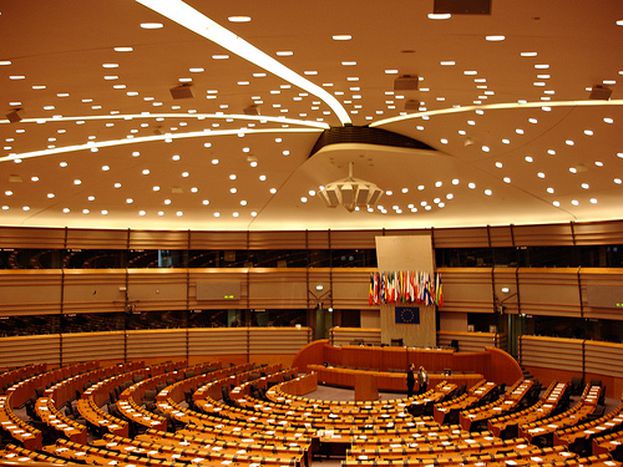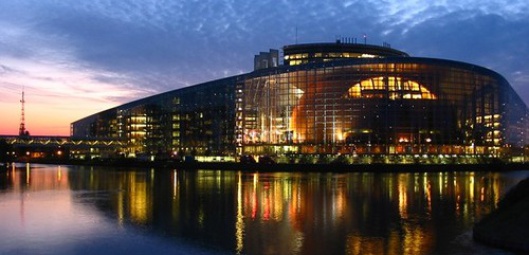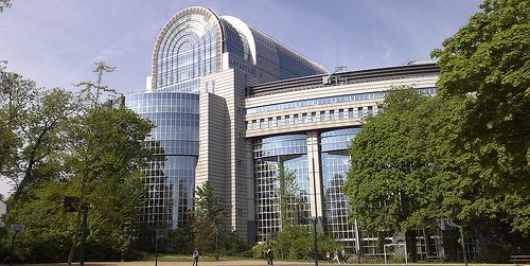
What the fridge is the European parliament?
Published on
Translation by:
 Neil Saddington
Neil Saddington
Every five years, MEPs are elected democratically across Europe. A look behind the scenes of this legislative power. Plus, a video
The European parliament (EP) is the only supranational parliament convened through the process of direct election. From the outset it was a ‘parliamentary assembly’ composed of delegates from national parliaments. The first direct democratic election to the EP took place in June 1979. Members of the European Parliament (MEPs) are therefore elected by citizens of the European Union. Every five years, parliamentary elections take place (the next is set for June 2009), and every European citizen has the right to vote or propose themselves as a candidate, provided they are resident within the EU. The European parliament is currently made up of 785 MEPs from 27 member states.
 The MEPs are arranged into seven pan-European political groups. For example, the European people’s party (EPP, 278 seats) is conservative and brings together the French UMP (union for a popular movement), the German CDU-CSU (christian democratic union), the Spanish PP (people’s party) and the British tories.
The MEPs are arranged into seven pan-European political groups. For example, the European people’s party (EPP, 278 seats) is conservative and brings together the French UMP (union for a popular movement), the German CDU-CSU (christian democratic union), the Spanish PP (people’s party) and the British tories.
The party of European socialists (PES, 216 seats) counts amongst its ranks members of the French PS (socialist party), the German PSD (social democratic party), and so on. These seven transnational groups cover the main political positions regarding European integration: the alliance of liberals and democrats for Europe (ALDE, 104 seats) is federalist, while the union for Europe of the nations (UEN, 44 seats) is sovereigntist.
 All MEPs are elected according to the model within their respective country of origin. There exist, however, some common denominators, such as most often (but not exclusively), full proportional representation. Also, seats are allocated to parties who have achieved at least five percent of all votes cast. The president of the European parliament is elected for two and half years, and retains the right of representation and certain budgetary powers. In 2007, this post was filled by the German Hans-Gert Pöttering, member of the CDU and the European people’s party.
All MEPs are elected according to the model within their respective country of origin. There exist, however, some common denominators, such as most often (but not exclusively), full proportional representation. Also, seats are allocated to parties who have achieved at least five percent of all votes cast. The president of the European parliament is elected for two and half years, and retains the right of representation and certain budgetary powers. In 2007, this post was filled by the German Hans-Gert Pöttering, member of the CDU and the European people’s party.
Three main roles:
1) It exercises legislative power, comparable to that of the council of the European Union. Through the co-decision procedure, necessary for two thirds of all EU directives, the EP and the Council draft European legislation proposed by the commission. Also, in certain circumstances such as the joining of a new member state, the council must have the assent of the EP
2) The European budget, which represents only 1% of the total EU GDP, is agreed on jointly between the EP and council, must be debated in the hemicycle and signed by the president. The committee on budgetary control either approves or rejects the spending of the budget by the commission
3) The EP maintains democratic control, through surveying the activities of the council and the commission. Through the process of nomination to the commission, the EP can dismiss those candidates deemed incompetent. It will vote to approve or reject the commission and can, if necessary, propose a vote of no confidence and demand the resignation of the commission as a whole
Problems in parliament
The Oneseat online petition, started in May 2006 by an ex-Euro MP and signed by more than one million EU citizens, proposes the establishment of one single seat for the EP in Brussels, instead of the three current seats in Brussels, Strasbourg and Luxembourg. Oneseat estimates that the annual cost of relocating parliamentary activities from Brussels to Luxembourg is in excess of 200 million euros (£170 million).
Debate over abstention
In 2004, the number of abstentions in France and Germany was at 50%; in the Netherlands, 60%; Slovakia, 80% and 75% in the Czech Republic and Slovenia. European elections are unfortunately considered as ‘second class national elections’ and are often overshadowed by national politics.
Consequences of the Lisbon treaty
If the Lisbon Treaty is adopted, the EP will see its role reinforced, notably thanks for the use of the co-decision procedure in the majority of European legislative acts.
Translated from Qu'est-ce donc que le Parlement européen ?


